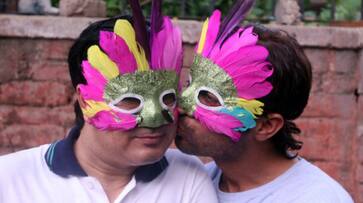The first decisive sign of a thought churn on the issue of homosexuality was reflected in the bold stand taken by the RSS's influential joint general secretary Dattatreya Hosabale on the platform of a media outlet in 2016
The supposed flagbearer of Hindutva in India — BJP and the Narendra Modi government — that speaks the language of economic development and that is castigated as conservative and regressive, has done what was not expected of it. Whatever be the personal views of the leaders in this dispensation, the government has decided to withdraw from citizens' bedrooms.
The government in its reply to the Supreme Court left it to the five constitutional experts on the bench of the apex court to do what they wanted with the constitutionality of the over 150-year old archaic colonial law — Section 377 of IPC — that criminalises gay liaison as much as it may put heterosexual couples in trouble, as the law does not specify the sexual orientation to which it applies. ‘Do what you deem fit’, is the government’s message to the highest court.
Chief Justice of India Dipak Mishra, who has suffered the wrath of a section of his community and opposition parties is the one who is presiding over the matter in Supreme Court.
Hinduism, we say, is not a religion, it is a way of life. What we like to forget is that homosexuality was very much INCLUDED in this way of life.
— Anand Ranganathan (@ARanganathan72) July 10, 2018
STOP looking at Hinduism through the obstinate, orthodox, and illiberal prism of Abrahamic or Victorian sensibilities. Stop. pic.twitter.com/ByDiChZEWv
IPC‘s #Section377 violates right to life, dignity, sexual orientation, no?
— Amrita Bhinder (@amritabhinder) July 10, 2018
Implications of #Section377 are not just on sexuality but also impact how society looks at gay community, it’s about perception, about livelihood and jobs for them. #SupremeCourtCase #Sec377
Hope #Section377 becomes history soon!#SupremeCourt #India
— Koena Mitra (@koenamitra) July 10, 2018
I have a feeling #377 is set to go tomorrow. And I do hope I’m right. It’s time.
— Nupur (@UnSubtleDesi) July 9, 2018
Religious/cultural arguments in the #Section377 case are weak in a secular state. The only argument courts should be concerned with are whether it violates any fundamental rights or does the state have a role to interfere in this matter. Libertarian route is good for everyone.
— ???? ????? (@kushal_mehra) July 11, 2018
Agreed. And I'm glad that the central government has decided not to contest the case to remove Section 377. If the courts cooperate, this could be a great, progressive legacy for this govt. There is no reason to have this law against homosexuality anymore in India. https://t.co/RpK5SI2D95
— HindolSengupta (@HindolSengupta) July 11, 2018
Section 377 of Indian Penal Code dating back to 1861 was introduced by the British
— Naina ???? (@NaIna0806) July 11, 2018
Homosexuality is neither a crime nor a disease. Its just a different sexual orientation.Criminalising it is against a right of an individual.
Time to shed this Victorian prudery #ScrapSection377
Clearly, the ‘conservatives’ have taken the lead in paving the way for decriminalising homosexuality in perhaps a throwback to the good old ‘liberal days’ when India produced the masterpiece treatise on sex and sexuality, Kamasutra, authored by Vatsyayana, a Hindu rishi.
The first decisive sign of a thought churn on the issue was reflected in the bold stand taken by Rashtriya Swayamsevak Sangh’s (RSS) influential joint general secretary Dattatreya Hosabale on the platform of a media outlet in 2016. He had muddied the waters when he said RSS “did not” believe that homosexuality was a crime, underlining individual personal freedom in matters so private as sexuality.
“Why should the RSS have an opinion on homosexuality? It is not a crime as long as it does not affect the lives of others. Sexual preferences are personal issues,” Hosabale had said.
Arun Jaitley had supported decriminalising homosexuality, at the cost of making an adverse commentary on the 2013 Supreme Court verdict banning gay sex. Speaking at a media platform he had said that it was “not in accordance with evolving legal jurisprudence” and that the court needed to reconsider it.
In 2017 speaking at the 13th Nehru Memorial Lecture at JNU, Hindu spiritual leader Sri Sri Ravi Shankar had responded to a student’s query, saying that homosexuality was not a sickness, rather just a tendency, which he had claimed changed. He had also said that he had witnessed homosexuals becoming straight and vice-versa. “If you stand up, nobody can insult you…”
While India is one among 70 countries in the world where homosexuality is still a criminal offence, the voices of protest have reached a crescendo and the political atmosphere too seems poised for the much-wanted switch to individual liberty.
Last Updated Jul 11, 2018, 6:42 PM IST









![Salman Khan sets stage on fire for Anant Ambani, Radhika Merchant pre-wedding festivities [WATCH] ATG](https://static-gi.asianetnews.com/images/01hr1hh8y86gvb4kbqgnyhc0w0/whatsapp-image-2024-03-03-at-12-24-37-pm_100x60xt.jpg)
![Pregnant Deepika Padukone dances with Ranveer Singh at Anant Ambani, Radhika Merchant pre-wedding bash [WATCH] ATG](https://static-gi.asianetnews.com/images/01hr1ffyd3nzqzgm6ba0k87vr8/whatsapp-image-2024-03-03-at-11-45-35-am_100x60xt.jpg)


